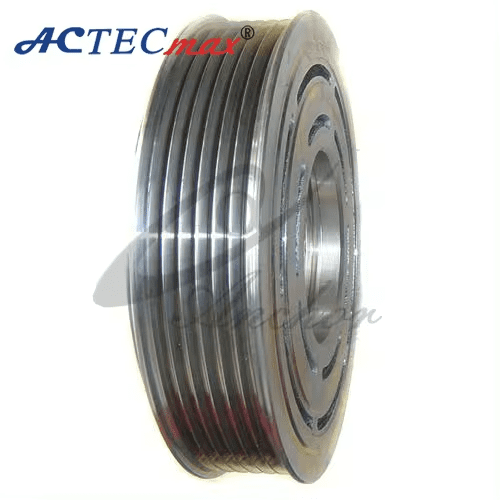
The AC compressor pulley is a crucial component of your vehicle’s air conditioning (AC) system, playing a significant role in ensuring that your car stays cool and comfortable during hot weather. It works alongside the compressor to manage the flow of refrigerant, which is essential for the cooling process. In this article, we will delve into the details of how the AC compressor pulley works, its importance, signs of failure, and how to maintain it for optimal performance.
What is an AC Compressor Pulley?
The AC compressor pulley is attached to the compressor and is driven by the serpentine belt of your car’s engine. When the AC is turned off, the pulley spins freely, and when the AC is activated, it engages the compressor through the clutch system. The clutch system allows the pulley to either drive the compressor or let it spin freely, depending on whether the AC system is in use.
Key Functions of the AC Compressor Pulley:
- Engagement and Disengagement: Controls when the compressor is activated based on whether the air conditioning system is in use.
- Transfer of Power: Transfers mechanical power from the engine to the AC compressor.
- Refrigerant Flow Regulation: Helps in controlling the flow of refrigerant through the AC system for efficient cooling.
Importance of the AC Compressor Pulley
The proper functioning of the AC compressor pulley is vital for maintaining the efficiency of your vehicle’s air conditioning system. Without a functional pulley, the compressor cannot circulate refrigerant, and the air conditioning system would fail to provide the necessary cooling.
Signs of a Failing AC Compressor Pulley
Recognizing the signs of a failing AC compressor pulley can help prevent further damage to the AC system and save you from costly repairs. Here are some common symptoms to look out for:
- Loud Grinding Noise: A worn-out bearing in the pulley often produces a grinding or squealing noise.
- AC System Not Cooling Properly: If the compressor pulley fails to engage, the air conditioning system will not cool the cabin efficiently.
- Visible Damage: Cracks or chips on the pulley indicate potential failure and should be replaced promptly.
- Clutch Failure: If the AC clutch does not engage or disengage properly, it could be due to a faulty compressor pulley.
- Burning Smell: A burning odor may be a sign that the pulley is seizing up or that there is too much friction.
How to Maintain Your AC Compressor Pulley
Maintaining the AC compressor pulley is essential for the long-term efficiency of your vehicle’s air conditioning system. Here are some maintenance tips:
- Regular Inspection: Check the pulley for any signs of wear or damage every few months.
- Clean the Pulley: Ensure that dirt and debris are not accumulating on the pulley as this can cause wear and tear.
- Lubrication: Keep the components well-lubricated to reduce friction and prevent premature failure.
- Check Belt Tension: Make sure that the serpentine belt driving the pulley has the correct tension and is not slipping.
Benefits of a Well-Maintained AC Compressor Pulley
- Increased Cooling Efficiency: A properly functioning compressor pulley ensures that the AC system runs efficiently, providing consistent cooling.
- Extended Compressor Life: Regular maintenance of the pulley can extend the life of the AC compressor, saving you money in the long run.
- Reduced Repair Costs: Identifying issues early on and replacing worn-out parts can prevent major damage to the entire AC system.
- Improved Fuel Efficiency: An efficiently running AC compressor reduces the load on the engine, leading to better fuel economy.
When to Replace the AC Compressor Pulley
If you notice any of the symptoms mentioned above, it’s time to inspect the AC compressor pulley. Replacing a faulty pulley is crucial to prevent further damage to the compressor and other parts of the air conditioning system. It’s recommended to consult with a professional mechanic for a proper diagnosis and replacement.
Conclusion
The AC compressor pulley is a small yet vital component of your vehicle’s air conditioning system. Keeping it in good condition is essential for the performance and longevity of your AC unit. Regular maintenance and timely replacement of faulty components will ensure that your car’s air conditioning system continues to keep you cool and comfortable during the hottest days.
Anchor Group Information
Anchor Group is a trusted wholesale supplier and manufacturer of automotive air conditioning parts, including high-quality AC compressor pulleys. We provide durable and reliable components designed to meet the needs of professional mechanics and DIY enthusiasts. For bulk purchases or wholesale inquiries, reach out to our Anchor Group Wholesale Department. As a leading B2B supplier, we offer competitive pricing, excellent support, and a range of products tailored to your requirements.